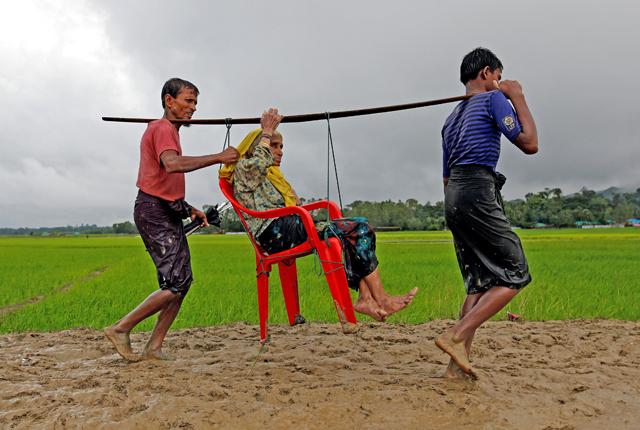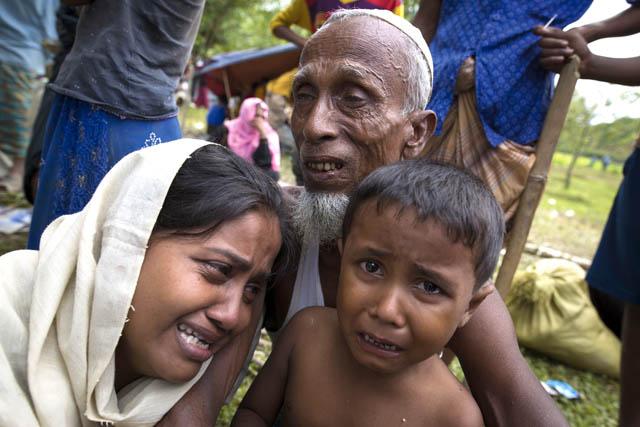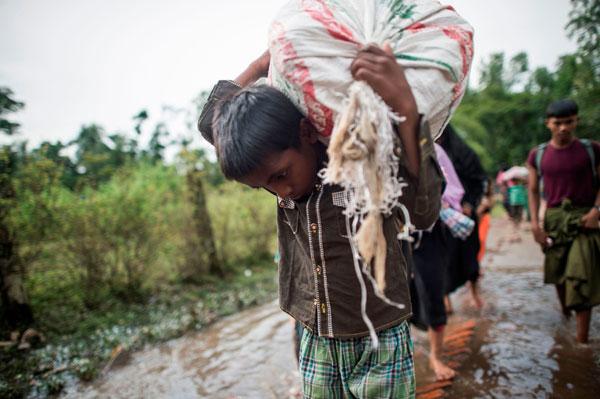You are here
By land, river and sea, Rohingya make their escape from Myanmar
By Reuters - Sep 06,2017 - Last updated at Sep 06,2017

Rohingya refugee men carry an old woman as she is unable to walk after crossing the border in Teknaf, Bangladesh, on Friday (Reuters photo)
COX'S BAZAR, Bangladesh — When his family of six crossed the monsoon-soaked Mayu mountains last week, Mohammed Ishmail tied his four-year-old daughter to his back with a longyi, or Myanmar sarong. His wife carried their two-year-old the same way.
"Some parts were so steep we had to pull ourselves up by tree roots," said Ishmail, a Rohingya Muslim, in an interview near the Kutapalong settlement for refugees in Bangladesh, shortly after arriving on Tuesday.
"At night, we just cut a clearing in the bush and slept there. We had two umbrellas for shelter."
The trek through the dense bush of the mountains took two days, but the journey from his home in Khin Tha Ma village — which he says was on fire the last time he saw it — took 10. He says it felt like a month.
The number of refugees who have arrived in Bangladesh from Myanmar's Rakhine state since militant attacks there on August 25 stands at nearly 150,000.
They have come by land, river and sea. Many have died along the way. Others have found themselves detained by human traffickers, demanding payment for their rescue.
Their destination is the Cox's Bazar region of impoverished Bangladesh, where hundreds of thousands of Rohingya already live in makeshift camps, reliant on overstretched aid agencies.
Once through the mountains, Ishmail's family came across villages in the northern part of the Maungdaw district — the epicentre of violence in the state since October — that had been abandoned. By his count, only about one in 20 houses had survived fires that have swept the area.
"Some people are still hiding in the forest on the Maungdaw side but in some villages there's no one," he said. "There was no one to ask directions."
But then there was. As they reached a canal and were trying to find a way to cross it, he said, two young Myanmar soldiers spotted them and aimed their guns, he said.
"I put my hands up and shouted, 'We're going to Bangladesh'," he said. There was a tense silence before the soldiers lowered their weapons.
"After that they showed us the best way to cross the canal," he added.
In one village, to escape the rain, Mohammed Ishmail entered a house still standing to find the bodies of five boys, who appeared to be teenagers, their necks hacked and heads nearly severed.
The death toll in the conflict is more than 400 and rising.
Myanmar says most of those killed have been insurgents, but accounts from new arrivals in Bangladesh suggest reprisals by Myanmar security forces and Buddhists against Rohingya civilians the government says are in cahoots with "extremist Bengali terrorists".
Myanmar rejects accusations that its security forces are targeting civilians saying they are fighting "terrorists".
Dozens of bodies, including those of women and children, have washed up on the Bangladesh side of a border river, many with bullet or knife wounds, according to Bangladesh border guards. Fishermen report seeing bodies floating in the river.
Reuters was shown one cadaver — what looked to be a teenage boy lying face up on the muddy river bank, a gaping wound on his face washed clean by the river.
In Maungdaw, thousands of people are on the move. A Rohingya aid worker, who was in touch with Reuters during his flight, recorded video of the journey on his mobile phone.
"It's like something I've never seen before, not even in any film," the refugee said after his arrival in Cox's Bazar.
The footage appears to show hundreds of people lining up to cross a river in Laung Don village. Some swim across, as two small ferries run back and forth.
At one river crossing, the aid worker said, fighters from the Arakan Rohingya Solidarity Organisation (ARSA) prevented ferries from crossing for half a day, telling civilians to return to their homes.
Campaign group Fortify Rights has documented how ARSA has prevented men and boys from leaving the area.
The refugee, who asked not to be identified so he could freely discuss his journey, said the fighters backed down when villagers pleaded with them.
In southern Maungdaw, the military's campaign has driven tens of thousands of people to the coast. Bangladeshi boatmen, in their hundreds, are going to pick them up.
Related Articles
DHAKA — Bangladesh Prime Minister Sheikh Hasina headed for the UN General Assembly on Saturday to plead for global help coping with the Rohi
MAUNGDAW , Myanmar — At least 18,500 Rohingya have crossed into Bangladesh since fighting erupted in Myanmar's neighbouring Rakhine state si
COX’S BAZAR, Bangladesh — Bangladesh on Thursday announced it would build one of the world’s biggest refugee camps to house all the 800,000-


















